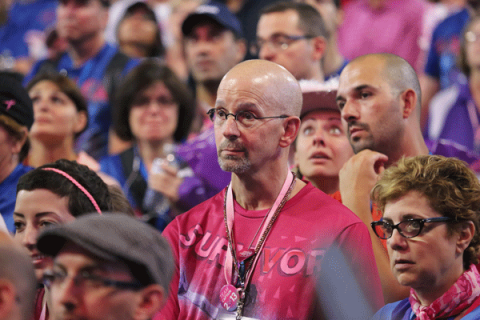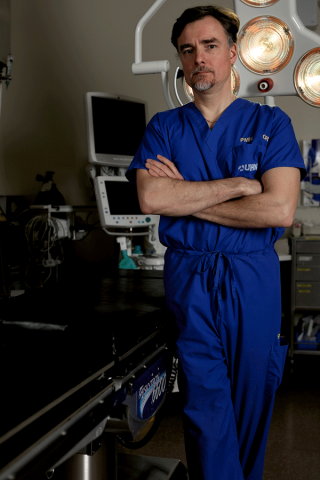
Celebrities from across the spectrum — actresses Cynthia Nixon and Christina Applegate, musicians Sheryl Crow, Kylie Minogue and Melissa Etheridge, breast cancer survivors all — have donned the ubiquitous pink ribbon, raising awareness and funds for research and treatment. Millions more worldwide have walked, run or organized charitable events, auctions and parties for the cure.
Yet despite that brightly illuminated soapbox, the issue of breast cancer in men remains the proverbial red-headed stepchild of the cancer movement. Only about one percent of all breast cancer diagnosis occur in men, according to Dr. Michael Reedijk, a surgical oncologist at Toronto’s Princess Margaret Cancer Centre and a scientist who specializes in both clinical and research interests concerning breast cancer.
Still, for any man who finds himself the one in 100,000 diagnosed annually, that lack of inclusion is doubtless troubling and a bit mysterious, given the pink ribbon campaign’s otherwise thunderously loud and sweeping reach.
“If you are asking me if that’s a problem, you are probably right,” Dr. Reedijk tells Samaritanmag. “If there was an ad in a popular magazine about breast cancer, it would be nice to see one sentence at the bottom saying, ‘By the way, men can get breast cancer, too. Please see your family doctor if you have any breast symptoms.’ But that doesn’t really happen.
“The information is out there but it’s not part of the program. The whole breast cancer culture is largely driven by women. There is a lot less than one percent of effort in the whole pink ribbon campaign directed at men. Should it be improved? Probably, and it’s probably pretty easy to do. Add to that that men tend to ignore their health care in a way women don’t.”
Toronto’s Todd Herzog knows all about the lack of awareness breast cancer in men can engender. A three-time cancer survivor — he battled Ewing’s Sarcoma 1971 at age 16, breast cancer in 2008 and thyroid “a few years later” — the now-retired former financial planner tells Samaritanmag, “When you’re talking about a stigma attached to breast cancer and men, it extends to the hospital.
“More than once when I’ve gone for a mammogram, when I approach reception, I get very odd looks, and then asked — in a nice way — if I’m lost, or some other question that implies I must not know where I am. I would think they know from the appointment list that they know a male is about to show up, but I guess not.
“That said,” Herzog continues, “when the actual mammogram is done, the technicians are very professional and know what they’re doing with a man, so I’m pretty sure they’ve seen others. And I have to wait in the general area, not the main waiting area which is just for women. Kind of gives me a taste of what it’s like for women in a male environment.”

Herzog was already on the lookout for potential breast cancer signs, but he is the exception. “It’s been suggested that my breast cancer was triggered by the radiation I had when I was 16,” he says. “I remember being told thyroid and breast cancer were possible side effects within 20 to 25 years. After 30 years I figured I was home-free, but it happened 40 years later.”
“The Internet is helping to spread information but it used to be that men were surprised that they could get breast cancer,” Dr. Reedijk says. “These days when I see men with breast cancer they usually have read about it. But it’s not something that men tend to think about, not even proactive ones who get annual physical exams.
“It’s also very rare that a family doctor does a breast exam on a male. So the awareness isn’t there, which tends to explain why males are diagnosed at a later stage. Also, the likelihood of men developing breast cancer increases with age.
“The median age for diagnosis is around 60. As men age, they can develop something called senile gynecomastia — senile as in old, not crazy — and that’s basically the development of breast tissue in men. That’s based on hormonal changes and that confounds the discovery of a new symptom in the breast.”
Eloquent and outspoken activists like Herzog — whose eldest daughter, 29-year-old Stephanie Gilman, was diagnosed with breast cancer last year — are essential to spreading the word.
So too are the efforts of high-profile survivors such as former KISS drummer Peter Criss, U.S. Senator Edward Brooke, Shaft actor Richard Roundtree and Cleveland Browns fullback Ernie Green, who have all publicly discussed their breast cancer diagnosis and treatment.
STORY CONTINUES AFTER THE VIDEO:
“I think men are stigmatized only insofar as they diverge from the norm,” Dr. Reedijk says. “In my experience, we in the health field don’t stigmatize and I don’t think men feel stigmatized when they present for treatment.
“I think men feel surprised, not ashamed which is how I read stigma. And if you look at some of the support websites for men battling breast cancer like Willow.org, you will find men voluntarily talking about the disease.”
“I am a spokesperson for the disease. For me, whether it’s women or men, it’s the same disease even though it’s definitely viewed as a women’s disease,” says Herzog, who adds that daughter Stephanie’s blog, passmeanothercupcake.com, has helped her connect with thousands of other survivors globally.
Herzog says the jury is still out on whether there is a genetic link between his and Stephanie’s cancers. “Likely just a bad coincidence,” he says. However, the pair were among the thousands walking in the 11th annual Weekend to End Women’s Cancers event last September.
Herzog continues: “I firmly believe that when they find the cure for breast cancer, it’s going to have connections to males as well as females. I don’t really much care how they find the cure so long as they are going through the doors looking for it. Anything I can do to raise more awareness or more money — and you never know if that last $10 is going to be the money that finds the cure — I am willing to do it.”
Mens Flynit Trainers